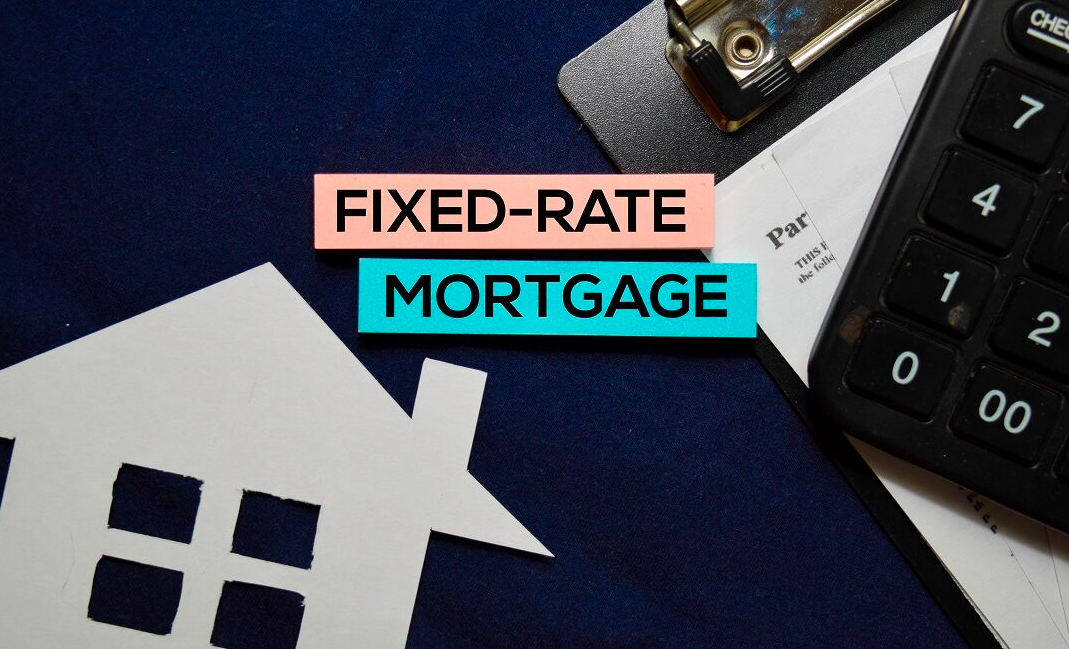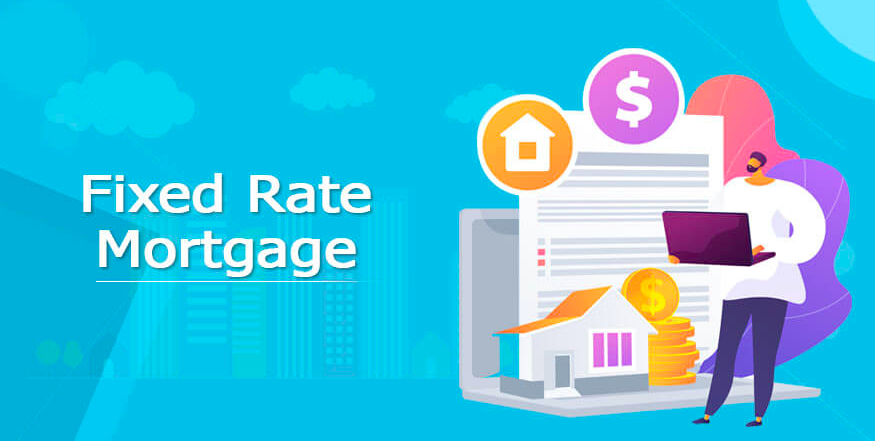A Fixed-Rate Mortgage is a type of Mortgage Loan where the interest rate remains the same throughout the Loan Term. Fixed-rate mortgage refers to a Home loan that has fixed interest rates which means that the mortgage carries constant interest rates from the start to the end.
Fixed-rate Mortgages are the most popular products for customers who want to know how much they have to pay monthly. These loans may be open or closed with the specific terms of 15 or 30 years or they may run for the length of time agreed upon by lenders and borrowers.
A fixed-rate mortgage is a loan secured by real property, where the interest rate is determined ahead of the loan disbursement (the rate that does not change during the loan terms). The Fixed-Rate Mortgage protects the borrowers from rising rates of interest, and the predictability of payments makes budgeting and financial forecasting easier.
What Is the Fixed-Rate Mortgage?
A Fixed-Rate Mortgage means that the interest rates remain constant throughout the entire loan period. Fixed-rate mortgage loans are popular and, with these loans, your monthly payments for principal and interest remain constant. However, some additional costs like property taxes and homeowners insurance may cause slight variations in monthly payments and enable the borrowers to budget and plan more efficiently. With Fixed-Rate Mortgage, the 30-year loan terms are most common, however, the borrowers can choose options for 20-year, 15-year, and 10-year loans.
What is the Working Process of Fixed-Rate Mortgage?
There are various types of Mortgage products available in the market, however, they boil down to two main categories variable-rate loans and Fixed-Rate Loans. With variable-rate loans, the interest rates are set above a certain benchmark. and later. it fluctuates at a certain period. The Fixed-Rate Mortgage carries the same interest rates throughout the entire period of the Loan.
The Fixed-Rate Mortgage doesn’t fluctuate with the Market. That’s why the Interest rates in the Fixed-Rate Mortgage stay the same regardless of where the interest rates go Up or Down. Most of the borrowers who purchase a home for the Long end are locked in an interest rate with a Fixed-Rate Mortgage. The Mortgage term is basically the life span of the Loan that is how long You make the payments on it.

What Are the Types of Fixed-Rate Mortgages?
There are various types of Fixed-Rate Mortgage. Here are some of them:
- Conventional Loan: These Types of Fixed-Rate Mortgage usually have some strict requirements such as a minimum 620 credit score and debt to debt-to-income ratio no higher than 43 percent. The Conventional Fixed-Rate Mortgage is offered by Banks, credit unions, online lenders, etc.
- FHA, VA, and USDA Loans: These Loans are often easier to qualify for as compared to conventional loans. The FHA Loans are widely available, however, the USDA Loans are designed for specific borrowers in the rural areas. The VA Loans are available for military service members, veterans, and eligible family members in the USA.
- Conforming Loans: The Conforming Loans adhere to the Federal Housing Finance Agency (FHFA) requirements, which include loan limits and allowing them to be sold on the secondary market.
- Non-conforming Loans: These Loans including Jumbo Loans do not require to meet the FHFA. To qualify for Non-conforming Loans, borrowers might face higher interest rates and strict requirements related to their credit score and cash reserves.
- Amortizing Loans: Most of the Fixed-Rate mortgages are amortizing loans. In these kinds of loans, borrowers’ monthly payments contribute to both the principal and interest charges, which allow them to build equity in the home from the beginning.
- Non-amortizing Loans: The Non-amortizing Loans offer lower monthly payments which may cover only the interest for the period. However, the borrowers need to know that, these loans may come with a balloon payment with an interest-only period ending, leading to higher some of money dues.
Fixed-Rate Mortgage Reviews
Most consumers prefer the Fixed-Rate Mortgage because the interest rate remains constant for the entire life of the loan. This offers the borrowers the guarantee that the Loan won’t change even if the Interest rate goes up. Here below are some of the Pros and Cons of the Fixed-Rate Mortgage:
Pros:
- The Fixed-Rate Mortgage protects the borrowers against interest rate volatility.
- The Fixed-Rate Mortgage provides predictable payment for borrowers.
- When the rates go down, the Fixed-Rate Mortgage gives a higher profit for the lenders.
- Although the borrower’s homeowners insurance and property tax payments might fluctuate, mortgage payments largely stay the same.
Cons:
- The Fixed-Rate Mortgage does not provide any flexibility for borrowers.
- When the rates are low the Borrowers have to pay more.
- When the rates are high the Borrowers earn less.
- A longer fixed-rate mortgage term can also be harder to qualify for.
Frequently Asked Questions (FAQs)
Question 1: What Are the benefits of a fixed-rate mortgage?
Answer: The Main Benefits of the fixed-rate mortgage include protection against interest rate volatility and predictability. This means that your rate won’t change in an environment where the interest rate rises and you can plan your finances around it because you will know how much your payment is every month.
Question 2: Why should I choose a fixed-rate mortgage over an Adjustable-rate mortgage?
Answer: there are various reasons why you may want to choose a fixed-rate mortgage over the Adjustable-rate mortgage. The fixed-rate mortgage provides the stability and predictability. Your rate will be locked in for the entire length of the loan when the rate goes up.
Final Verdict
A fixed-rate mortgage is a home loan that has a constant interest rate for the lifetime of the Loan. The fixed-rate mortgage, typically offered in 10-, 15-, 20-, 25-, and 30-year terms gives the homeowners and homebuyers the security of a predictable monthly payment. The rates for the fixed-rate mortgage tend to be strongly linked to the bond market. However, when the bond market goes up, the fixed-rate mortgages remain the same. The fixed-rate mortgages are a popular choice among US homebuyers in order to avoid the interest rates risk. fixed-rate mortgage provides the security of knowing that the rate won’t change and how much you’ll have to pay.
